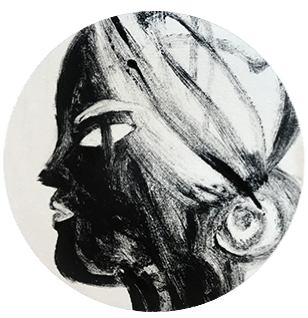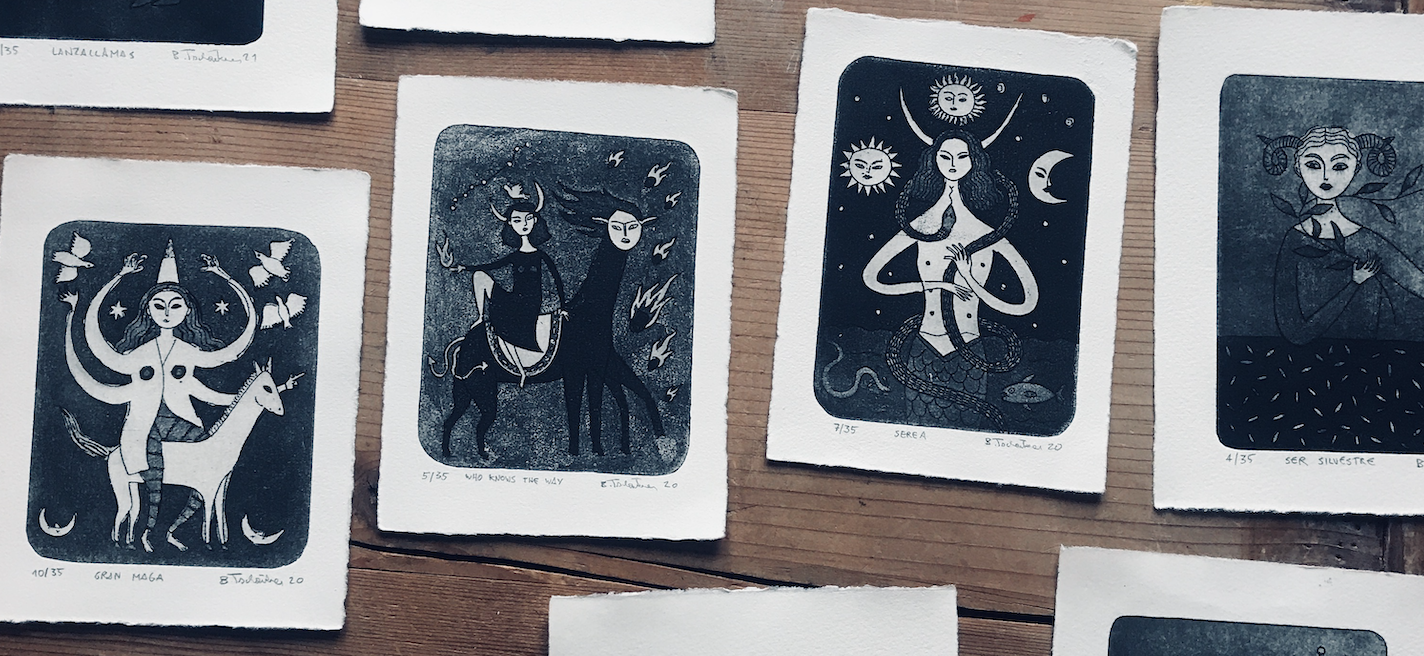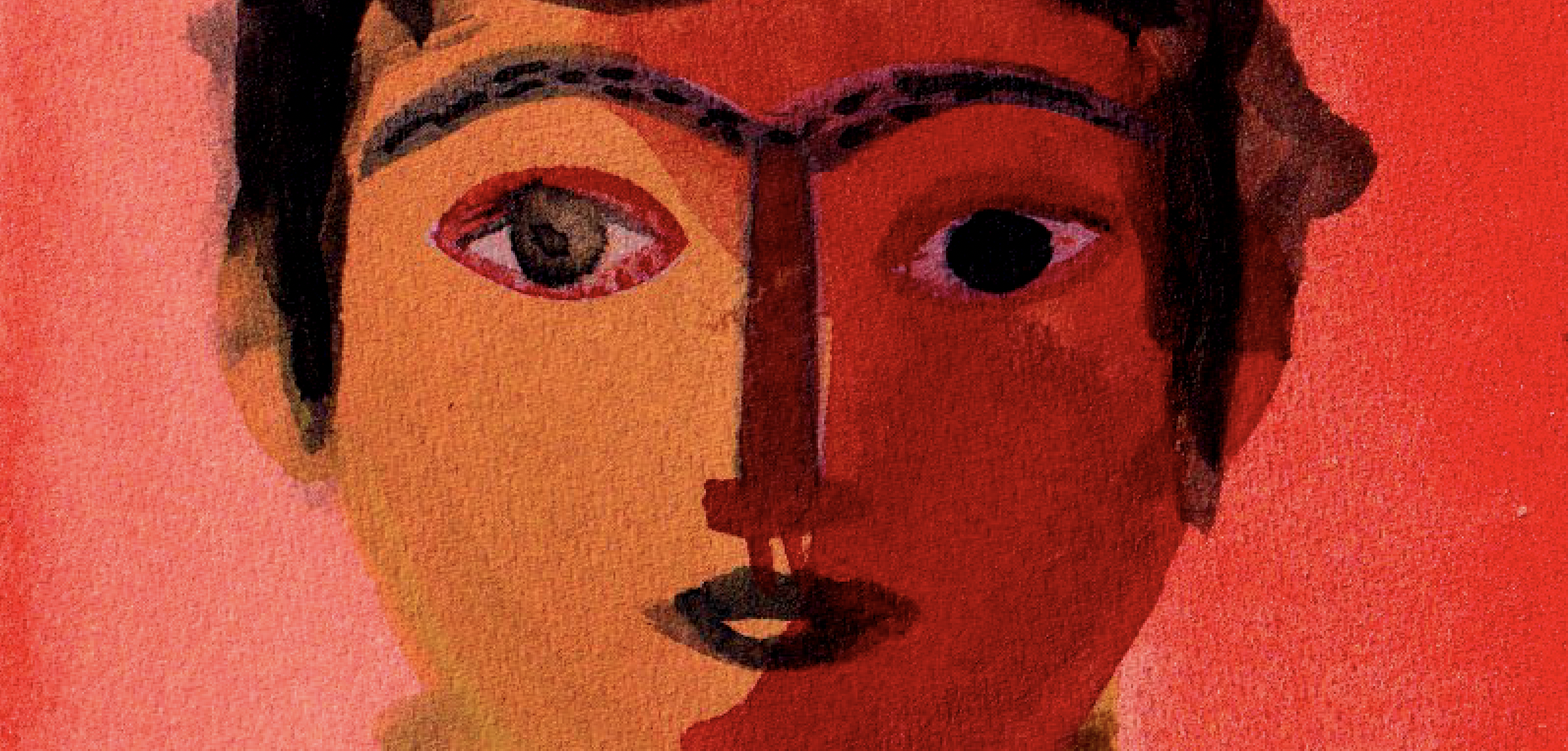You don’t remember in which country or year it was, it does not matter. In a mountain village, not far away from that city as old as time, you meet a man. He has dark eyes and plays the Tambur like a young god, and one night, you kiss him and you stay with him for some time. Days, weeks, or months, who knows – it becomes time beyond time.
It is the time of the pomegranate harvest, and your lover lives in a tiny house in a pomegranate grove overlooking the village. You sleep on the carpets your lover spreads on the floor every evening, underneath an enormous window that fills itself with wind and fragrances and sparkling stars at night, and one night, your lover points out the Pleiades and tells you that this is what his name, which you have long forgotten, means in his language, Pleiades.
Your presence in this house is as forbidden as the wine your lover brings at night. But there is no point in hiding, everybody knows that you are in the village. Everybody knows that you are here, the foreigner, the woman in the house of the man. Sometimes, you are a little bit afraid that the bearded men will come and knock at the door and drag you out. But if you have learned something here, it is to give yourself into the hands of people, to trust, which is not a means to survive, but the only way to live.
Above the river, there is an abandoned church. You only know that it’s a church because they told you, it is a ruin now, sad and unrecognizable, rapidly falling apart, a building beyond hope. The walls of the church, on which once there might have been frescoes of Mary and Jesus, are now covered with graffiti speaking of the names of couples, the testimony of lovers who have found an improbable refuge for their love in this building. You can only tell that it is a church because sometimes, you see candles burning in the arch of an abandoned window. You wonder who it is that brings those candles because you have been told that all Christians of this village, which once was a Christian village, are long gone.
One day, your lover leads you out from the village, through the green hills, through the forest. He knows every plant and rock in this landscape, but today, he wants to show you something else. He stops at a small gate, and he calls a name (you have also forgotten that name)
An old man comes out, he looks like Saint Nicolaus, with a big, white beard and friendly eyes. He, too, has a tiny house, and then you sit in his kitchen next to a wood-burning stove and shiny red pots and walls decorated with dried onion and garlic, a kitchen like in a fairy tale.
To your surprise, he speaks perfect, accent-free Oxford English. He tells you that he lived in the UK for decades. This man is educated, interesting, sophisticated, and he seems completely out of place in this forest, in this mountain village full of pomegranate farms and shisha restaurants. He also has these occasional bits of bitterness, of sadness in him which he does not hide and which don’t need to be explained. You know it from other people here.
The man who looks like Saint Nicolaus and talks like an English gentleman asks you if you want to try his wine. He made it himself, your lover adds. The color of the wine is gold and amber, and it tastes sweet and dense, like honey and raisins.
The back door of his house opens to an enormous garden. It is intensely green, lush, and abundant, there are vegetables and fruit, red pepper and cucumber and tomatoes everywhere. It is well-tended and tidy, and you ask yourself how one person could possibly tend to such an enormous garden alone.
You walk through that garden like a bird flies through the sky. This garden is like paradise, perfect, ready, ripe, waiting to be explored. Through the garden, you walk up the hill, and there is another house, a dream house, with a lot of glass and carved wood, as it is the tradition there, and inside there are colorful carpets and musical instruments and walls of books. And something in your chest recognizes something, and a yearning that already contains its very fulfillment rises from your heart, it is a feeling that is sweet and hard to bear at the same time, everything is here, and yet something is missing.
Your lover sits down at the piano, another instrument he plays virtuously, and you stand in that moment, and it is as if you had come home. Just be in this house and know this garden around you, and to be hidden in the forest and the hills, and all this wrapped in the endless desert of the South. I want to be lost here.
This village is famous in the South. People come here from far away to find a bit of freedom in the forest; the village is full of abandoned houses and shady restaurants, where travellers smoke shisha and eat kebab underneath the pine trees (you’ve never been in one, your lover brings you fresh bread and aubergine mousse and dates every night). But in this season, most of the time these places are empty, with loud music blaring from loudspeakers for no one.
What is this hidden treasure, you say to your lover. Why is this a secret, the world needs to see this, it is precious, it is incredible! I didn’t know that this little village had such a gem! Why is he hiding it!
Your lover tells you that this paradise has not always been hidden. Here was a restaurant once, he tells you, but the authorities closed it, because the man had sold weed, and he does not get a license anymore. And so his paradise turned into his prison.
What you like to remember most about this man and his garden: The grapes he gave you from his vines, of which every single one tasted so distinctively different that it seemed to be impossible, almost as if each of them were a different kind of fruit.
…
And sometimes, you also think of the men of the North. The mystical friend who you first met in the South – he played the flute for you because you couldn’t speak each other’s language. Years later, you met him again in the North, and in the meantime, he had taught himself to speak English.
One late afternoon, after the merciless sun had lost some of its power, he took you for a hike, and there, in a grove high up on the mountains, he lit a fire and brewed herbal tea for you in a little tin teapot he had brought in his backpack, and you said, this is the best tea I ever had, and he looked at you and said: Actually, for me, as well.
Somewhere on the way, he tells you that he needed to stop, do you mind, he asks you, you don’t mind, and he figures out the right direction and starts to pray, while you sit on a rock nearby and write. And something connected you in that moment, because you knew that he was thinking of you in his prayer, and he knew that your writing included him. He finished, and you continued to walk in silence, you didn’t talk a lot, you didn’t need to, and only years after you spoke of this moment, smiling at each other without seeing each other, thousands of miles apart.
On the way down, it became dark, you groped your way back down to the last hill over the valley, and in the last valley you stopped at a hut, there were some mountain men with horses, and a veranda where you sat down on an old carpet and ate scrambled eggs served in an old iron pan, talking about the nature of God, you don’t remember what you had to say about the nature of God back then, but you remember that your friend told you that he liked to imagine that God as woman because once God had appeared to him in his dream as one.
And then in the North, there is also the image of an old man sitting on the ground in front of a Mosque, reading an old copy of the SPIEGEL Magazine. It was his way of learning German, reading every article word by word and underlining every word he didn’t know, and then waiting for German tourists to translate them to him. There were not many words underlined, and they were so difficult that they were really hard to explain.
Later at night, you meet him in a park, on a bench, where you talk for hours, under the pine trees and later under the stars. The old man reading the SPIEGEL in front of the mosque with his excellent German is a poor retired shoemaker, and he tells you his story, which is full of hardship and screaming injustice. In his story, you find a is a sadness that is greater than his story – because this is not an unusual story, but a typical one, one that you had heard many times in different forms, with different names and different faces.
Then he tells that if you want to get home safely, it’s time for you to get home now, and you say goodbye. The next day, you leave for the South.
In some mystical traditions, God is imagined as a great weaver, a woman weaving time and space. And in this great carpet, you imagine human lives as colorful threads, entangling and detangling, creating a beautiful pattern with (and for) each other for a moment before the great weaver, with her infinite number of fingers, picks up the threads and carries on weaving you.
In a kaleidoscopic moment, ephemeral and sparkling, their existence is grazing your existence. For a moment, you connect with each other‘s essence. Not all of them you really got to know, and you know that some of them you will never meet again, but you’re glad you know that they exist. You like to remember them, and you know that to remember each other means to carry fragments of each other within us.
We’ve become witnesses of each other, and that’s the beauty of life, I guess, to become a witness to the beauty of each other’s existence, to recognize each other, which means to recognize ourselves in the other, and maybe, to tell about it.


